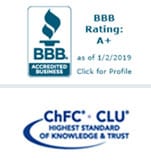

Did you know that losing money can be hazardous to your health? A recent study published in the Journal of the American Medical Association found that participants who lost 75% or more of their wealth in a short period of time had a 50% higher risk of death over the next 20 years. These sudden losses, called “negative wealth shocks,” were also linked to a greater incidence of stress-related illnesses, cardiovascular disease, depression, anxiety, substance abuse, and suicide.
Then there are all the indirect ways a sudden loss of resources can impact your health, such as being unable to fill prescriptions, pay insurance premiums, or afford expensive procedures. And for most of us, healthcare is the largest expense in retirement. The evidence is clear: protecting your wealth is good for your health and vice versa. Here are five ways to maintain your wealth and health in retirement.
1. Reduce Risk
As we age, our bodies become less resilient and more susceptible to illness and injury. This is also true for our finances. Think about it: you probably can’t eat, drink, or smoke like you did at 25, and you shouldn’t invest that way, either. Younger investors are generally encouraged to be aggressive since they are in their peak accumulation years and have time to recover from market downfalls. Once they hit their 50s and 60s, however, investors should focus on preserving their wealth, which often means shifting to more conservative investments.
How do you know if you’re taking on too much risk? A financial advisor can assess your current holdings and determine if you are carrying an appropriate level of risk for your age and situation. The best advisors will look at your investments as part of a holistic retirement plan that includes insurance and tax planning.
2. Avoid Emotional Decision-Making
Economists frequently joke that the stock market is simply an indicator of investors’ emotions—chiefly, fear and greed. When investors get greedy, they buy, pushing stock values upward, and when they get scared, they sell, causing values to fall. Taking this concept a little further, CNN actually created the Fear and Greed Index (FGI) to track investor sentiment. The idea behind this kind of investing is to buy when fear is high and stocks are cheap and sell only when other investors are greedy. That is, to act logically rather than emotionally.
Choosing to put rationality before anxiety or avarice is the best way to build, and stick with, a retirement plan. Remember that every financial strategy in your plan plays an integral role in helping you reach your long-term retirement goals and shouldn’t be sacrificed for short-term gain.
3. Strategize Social Security
You can claim Social Security as early as age 62 and this is also the age at which most Americans choose to claim. In the early 1900s, most Americans also believed that drinking radioactive water was good for your health, which only goes to show that there is a distinct difference between can and should. Can you claim Social Security at 62? Sure. Should you? Well, it depends.
Unless you need the money immediately and have no alternative, or you are in poor health, it is generally better to delay claiming Social Security. By taking Social Security before full retirement age (66 or 67 depending on your date of birth), your benefit is permanently reduced. Even better: each year after your full retirement age (until age 70) that you delay claiming, your monthly benefit will see an 8% increase.
4. Save in an HSA
If you are under 65, HSAs, or Health Savings Accounts, are a convenient way to save for medical expenses. Often, account holders will enroll through their health insurance provider, but most financial institutions also offer these accounts. In 2019, you can contribute up to $3,500 for single coverage health plans or up to $7,000 for family coverage. Account holders over the age of 55 are also able to make an additional $1,000 catch-up contribution.
HSAs come with attractive tax benefits. All contributions are made pre-tax and deducted from your taxable income. Within the account, the money grows tax-free and it comes out that way, too—as long as you’re making a withdrawal for eligible expenses. If you start your account early enough and give it adequate time to grow, an HSA can be a great way to pay off large health care deductibles or long-term care premiums.
5. Consider Long-Term Care Insurance
Did you know that both men and women are expected to live 10% longer than two decades ago? As the average life expectancy rises, however, expect the cost of retirement to follow, especially the cost of long-term care. According to the U.S. Department of Health and Human Services, over 75% of Americans turning age 65 will require some form of long-term care, which includes at-home custodial care, adult day care, assisted living, and nursing homes.
Long-term care isn’t cheap. Depending on the level of care, long-term services in Connecticut can cost anywhere from $4,000 to $14,000 per month. Expenses can be paid out-of-pocket, or through privately-purchased long-term care insurance. A financial advisor can help you determine which payment option is right for you.
Tune in to WTNH News 8 at 9:15 AM on Monday, June 17th, as Roger Cowen discusses these and other ways to protect your wealth and health.


Sara McKinney
saractag@gmail.com
As Cowen Tax Advisory Group’s Digital Content Marketing Specialist, Sara provides in-house copywriting and manages the company’s electronic records system, email marketing, and blog.




